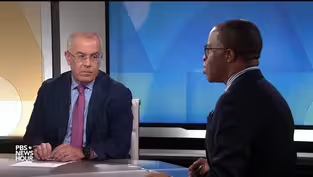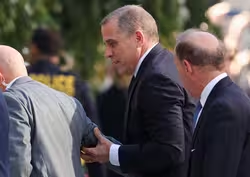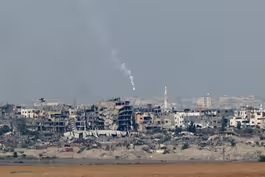
Saudi foreign minister on Israel-Hamas war, wider challenges
Clip: 12/8/2023 | 8m 58sVideo has Closed Captions
Saudi foreign minister discusses Israel-Hamas war and wider challenges in Middle East
Foreign ministers from several Arab allies of the United States are in Washington this week for meetings with the Biden administration over the Israel-Hamas war. Nick Schifrin sat down with the foreign minister of the Kingdom of Saudi Arabia, Prince Faisal bin Farhan Al Saud, for a candid conversation about the way forward from the violence and Saudi Arabia's role in the region.
Problems playing video? | Closed Captioning Feedback
Problems playing video? | Closed Captioning Feedback
Major corporate funding for the PBS News Hour is provided by BDO, BNSF, Consumer Cellular, American Cruise Lines, and Raymond James. Funding for the PBS NewsHour Weekend is provided by...

Saudi foreign minister on Israel-Hamas war, wider challenges
Clip: 12/8/2023 | 8m 58sVideo has Closed Captions
Foreign ministers from several Arab allies of the United States are in Washington this week for meetings with the Biden administration over the Israel-Hamas war. Nick Schifrin sat down with the foreign minister of the Kingdom of Saudi Arabia, Prince Faisal bin Farhan Al Saud, for a candid conversation about the way forward from the violence and Saudi Arabia's role in the region.
Problems playing video? | Closed Captioning Feedback
How to Watch PBS News Hour
PBS News Hour is available to stream on pbs.org and the free PBS App, available on iPhone, Apple TV, Android TV, Android smartphones, Amazon Fire TV, Amazon Fire Tablet, Roku, Samsung Smart TV, and Vizio.
Providing Support for PBS.org
Learn Moreabout PBS online sponsorshipAMNA NAWAZ: Foreign ministers from several Arab allies of the United States are in Washington this week for meetings with the Biden administration about the Israel-Hamas war.
Nick Schifrin sat down earlier today with Saudi Arabia's foreign minister, Prince Faisal Bin Farhan Al Saud, to discuss that war and the kingdom's role in the region.
NICK SCHIFRIN: Prince Faisal, Mr. Foreign minister, thank you.
Welcome to the "NewsHour."
You are here in Washington.
You are calling for a cease-fire.
The U.S. is not.
What is your message today here in D.C.?
PRINCE FAISAL BIN FARHAN AL SAUD, Saudi Foreign Minister: Our message is that too many civilians have already died on October 7 and since.
We have now seen a level of carnage in Gaza that is unprecedented, that is unjustifiable under any pretext of self-defense.
So, we need to find a path out of this conflict, and, therefore, we think there should be a cease-fire that can allow us, first of all, to address the dire humanitarian situation in Gaza.
And we're not just seeing people dying from Israeli bombs or from the fighting on the ground.
We're also seeing people dying now of diseases such as cholera because of the broken-down sanitary system.
So we need to focus on protecting the lives of the civilians of Gaza.
NICK SCHIFRIN: The U.S. is vetoing the Security Council resolution.
Does that mean they're not listening to you?
PRINCE FAISAL BIN FARHAN AL SAUD: Unfortunately, we are seeing a position that cease-fires are somehow a dirty word, and I can't - - honestly can't understand that.
Usually, what we see when there's a conflict in the international scene, we are all always looking for a way to end the fighting.
So we're very disappointed that the Security Council hasn't been able to take a firm position on that, and we certainly disagree with the U.S. that this resolution deserves -- doesn't deserve to go through.
NICK SCHIFRIN: How will you respond to that?
I mean, you're here chairing the Arab Islamic Ministerial Committee with a group of foreign ministers.
What will you do concretely in response to, to be honest, what it sounds like, the U.S. not listening?
PRINCE FAISAL BIN FARHAN AL SAUD: I mean, we're going to continue to push this very important message that too many civilians have already died, there is no reason for more civilians to die, and, more importantly, this continuing military operation and this continuing level of civilian casualties does not serve anybody's interests, including the interests of Israel or its security.
NICK SCHIFRIN: With all due respect some officials, tell me that your public calls do not match your private calls to destroy Hamas.
Why the dual message?
PRINCE FAISAL BIN FARHAN AL SAUD: There is no dual message.
What we say in private and what we say in public is exactly the same, not just for the kingdom, but for all of the Arabs.
I am very proud that what we are saying in public and private is the same.
I can't say the same for some of our Western interlocutors.
NICK SCHIFRIN: Meaning what the United States says in public and private is different?
PRINCE FAISAL BIN FARHAN AL SAUD: I didn't name any.
And I'm not going to -- it's not the United States or any particular country.
I'm just saying that some of our Western interlocutors are saying things in public that they are not saying in private.
NICK SCHIFRIN: Today, Antonio Guterres, the secretary-general of the U.N., told the Security Council -- quote -- "There is a high risk of the total collapse of the humanitarian support system in Gaza."
In Northern Gaza, 90 percent of those remaining there have spent at least one full day and night without food; 22 of 36 of Gaza's hospitals are not working.
Is there will among Arab nations to step in with a humanitarian plan to help Gaza?
PRINCE FAISAL BIN FARHAN AL SAUD: The situation is extremely dire, just as you described.
We have already stepped up.
There's Arab countries and others.
We have provided significant quantities of aid.
This aid is being restricted from going into Gaza.
This aid is being blocked and obstructed.
I was struck some -- a week or so ago when I was at the U.N. Security Council, the Israeli representative said -- and I quote -- "Humanitarian aid is important, but more food, water and medicine will not bring us a solution."
And I'm curious,what is a solution?
NICK SCHIFRIN: Gazans tell us that they feel abandoned by the Arab world.
They're angry.
The war continues.
Do you think you have let them down?
PRINCE FAISAL BIN FARHAN AL SAUD: I think they are justifiably angry that they are suffering while the international community as a whole has let them down.
You see that the established mechanisms for international security and peace have not acted.
This is a failing of the entire international community.
We all bear that burden.
NICK SCHIFRIN: Are you worried that the Israeli Defense Forces are waging their campaign in a way that the region could be engulfed with a kind of extremism that would prevent your vision of the future to be prevented from actually being achieved?
PRINCE FAISAL BIN FARHAN AL SAUD: This is absolutely a critical concern that we have.
These images of dead babies in Gaza, of collapsed buildings, just like the images of October 7 have been shocking to the Israeli public, the images since shocking and infuriating not just to Arabs, not just to people in our part of the world, but all over the world.
It means that people are losing their trust, first of all, in the two-state solution.
They're losing their trust in the argument for peace in our region, but they're also losing their trust in the international systems of security and legitimacy.
And that, I think, is a danger to us all.
And, of course, there is the risk of extremism.
There is the risk of, whether it's lone wolves or others being driven to violence by these images and these scenes of civilian suffering.
NICK SCHIFRIN: Is there a risk that, as the Gaza war goes on, as the world continues to see these scenes of sufferings, you could refuse to re-begin talks to normalize relations with Israel and everything associated with that deal?
PRINCE FAISAL BIN FARHAN AL SAUD: We are convinced that the only solution is peace.
And this is the strategic choice we have made in Saudi Arabia and all of the Arabs have made, and from 1982, when Saudi Arabia proposed the face initiative to the 2002 Arab peace initiative and beyond.
We are committed to making peace, including supporting peace with Israel.
And we will engage and we are ready to engage with a two-state solution.
NICK SCHIFRIN: But this is a little different.
This is normalizing relations with Israel, getting a security guarantee from the United States, getting civilian enrichment, nuclear program, from the United States, giving the Palestinians I'm not sure exactly what.
Are you willing to restart those negotiations at some point?
Or, at some point, do those negotiations become impossible, given the nature of the war?
PRINCE FAISAL BIN FARHAN AL SAUD: We are focused on ending the war now, but we are also very, very interested in moving the cause of peace forward.
And that has been what we were working on before.
And that is something we continue.
And I have to say, both in my engagements with the administration and with Congress, I hear a clear message that peace is the answer.
And that will need a Palestinian element.
That will need us to move irrevocably to a Palestinian state.
NICK SCHIFRIN: Does the kingdom, does the crown prince consider the possibility there could be a kind of Sadat moment of going to Israel to make the kind of peace that you're talking about?
PRINCE FAISAL BIN FARHAN AL SAUD: So, the priority now is, let's stop the killing.
And, after that, hopefully, we can focus again on peace and moving forward.
And peace means dignity and prosperity for the Palestinians and a state in which they can have those and that will allow them to live in the region, along with Israel, in that peace and dignity.
NICK SCHIFRIN: Are there any Arab governments willing to come into Gaza, as the U.S. is requesting, as some kind of peacekeeping arrangement after the war?
PRINCE FAISAL BIN FARHAN AL SAUD: Look, we have made two things clear, that we cannot talk about the day after in Gaza without talking about Palestine as a whole.
That is a unified position of the Arab world.
And we have also said that we cannot talk about the day after without an end to the fighting, because we don't know, what does the day after mean?
What does the day after look like?
What does Gaza look like?
NICK SCHIFRIN: Since October the 7th, the Houthis from Yemen have launched cruise missiles toward Israel, attacked and even hijacked a commercial vessel in the Red Sea, and have sent drones toward U.S. ships.
How concerned are you by these Houthi attacks?
And what messages are you delivering to the Houthis directly?
PRINCE FAISAL BIN FARHAN AL SAUD: Look, we are clear that escalation is in nobody's interest.
And that's the message we are sending very clearly.
We hope that we can focus on ending the situation in Gaza and the conflict.
The risks of this conflict continuing and this conflict escalating and spiraling are significant and real.
We are committed to ending the war in Yemen and we are committed to a permanent cease-fire that opens the door for a political process.
And we are going to continue to work towards that end, and we are very -- fully engaged in that.
And I don't think that we are going to see a significant risk to that right now.
NICK SCHIFRIN: Mr. Foreign Minister, thank you very much.
PRINCE FAISAL BIN FARHAN AL SAUD: Thank you very much.
Addiction treatment disparity highlights racial inequities
Video has Closed Captions
Clip: 12/8/2023 | 8m 47s | Racial disparity in addiction treatment access highlights inequities of opioid epidemic (8m 47s)
Brooks and Capehart on political impact of Hunter Biden case
Video has Closed Captions
Clip: 12/8/2023 | 10m 40s | Brooks and Capehart on the political impact of the latest charges against Hunter Biden (10m 40s)
A look at the latest charges filed against Hunter Biden
Video has Closed Captions
Clip: 12/8/2023 | 4m 32s | A look at the latest federal charges filed against Hunter Biden (4m 32s)
The troubled safety record of the Osprey aircraft fleet
Video has Closed Captions
Clip: 12/8/2023 | 4m 51s | The troubled safety record of the Osprey aircraft fleet grounded by the U.S. military (4m 51s)
U.S. service members perform 'Ocho Kandelikas' for Hanukkah
Video has Closed Captions
Clip: 12/8/2023 | 3m 23s | U.S. service members perform 'Ocho Kandelikas' for Hanukkah (3m 23s)
U.S. vetoes UN resolution for Gaza cease-fire
Video has Closed Captions
Clip: 12/8/2023 | 4m 49s | U.S. vetoes UN resolution for cease-fire as Israel ramps up airstrikes in Gaza (4m 49s)
Providing Support for PBS.org
Learn Moreabout PBS online sponsorship
- News and Public Affairs

FRONTLINE is investigative journalism that questions, explains and changes our world.

- News and Public Affairs

Amanpour and Company features conversations with leaders and decision makers.












Support for PBS provided by:
Major corporate funding for the PBS News Hour is provided by BDO, BNSF, Consumer Cellular, American Cruise Lines, and Raymond James. Funding for the PBS NewsHour Weekend is provided by...






